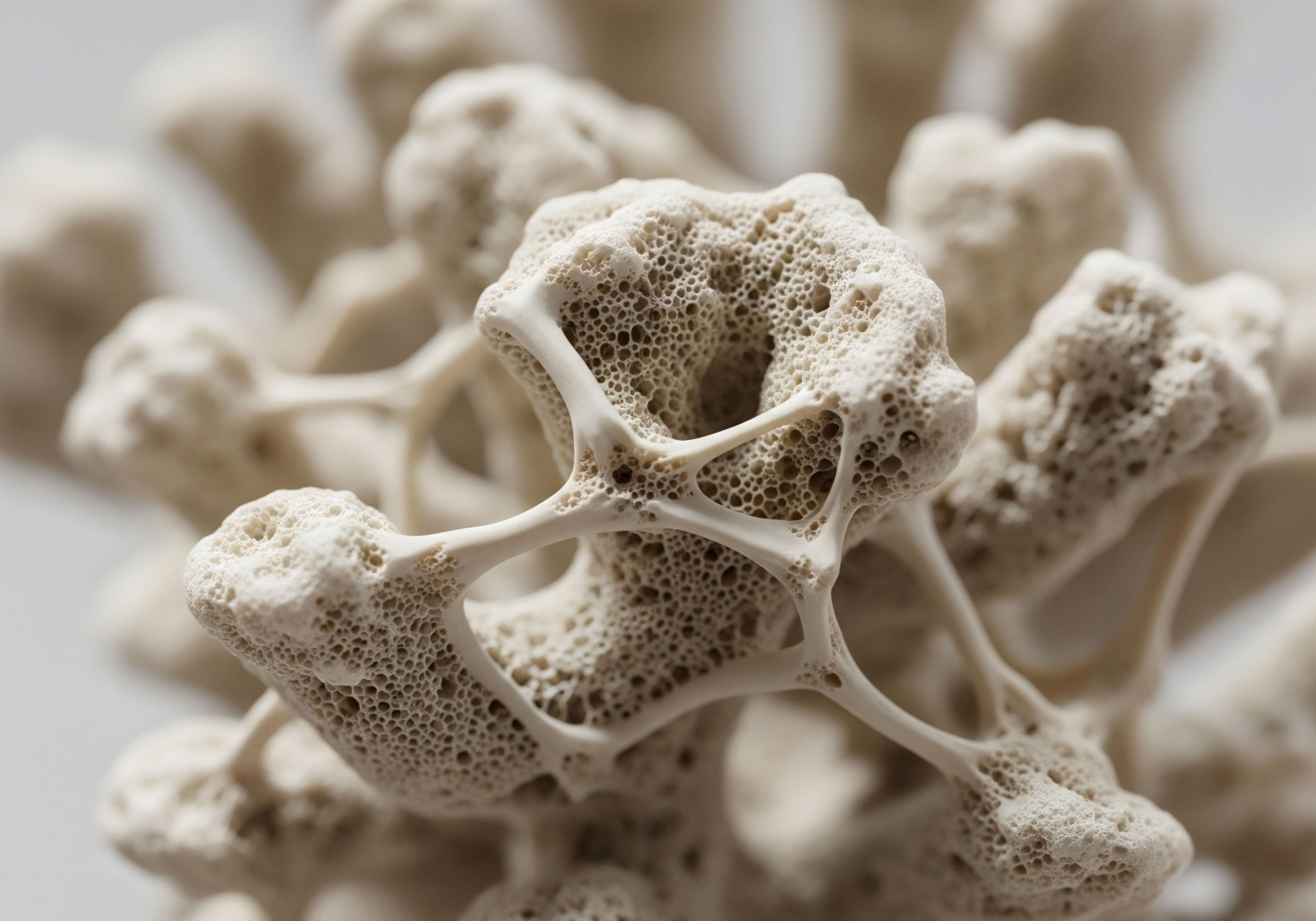

Fundamentals
Do you find yourself pausing mid-sentence, searching for a word that once came effortlessly? Perhaps you experience a subtle cloudiness, a diminished sharpness in your daily thought processes, or a feeling that your mental quickness has waned. These experiences, often dismissed as simply “getting older,” can be deeply unsettling.
They challenge your sense of self, affecting everything from professional performance to personal interactions. The frustration of a mind that feels less agile is a common, yet frequently unaddressed, concern for many individuals. We recognize the profound impact these shifts can have on your vitality and overall well-being.
Understanding these changes requires looking beyond surface symptoms and examining the intricate biological systems that govern our health. The human body operates as a complex network, where various systems communicate and influence one another. Among these, the endocrine system, a collection of glands that produce and secrete hormones, plays a particularly significant role.
Hormones act as chemical messengers, directing a vast array of bodily functions, including those related to cognitive processing and mental acuity. When these messengers are out of balance, the ripple effects can be felt throughout your entire being, including your brain.
Cognitive changes, often perceived as age-related, frequently stem from deeper imbalances within the body’s interconnected biological systems.
Testosterone, a steroid hormone primarily produced in the testes in men, is widely recognized for its role in male reproductive health, muscle mass, and bone density. Its influence extends far beyond these well-known functions, however. This vital hormone also impacts mood regulation, energy levels, and, significantly, brain function.
Testosterone receptors are present throughout the brain, particularly in areas associated with memory, spatial cognition, and executive function. A decline in circulating testosterone levels, a condition known as hypogonadism or “low T,” can therefore have widespread systemic consequences, potentially contributing to the cognitive shifts many men experience.

Testosterone’s Role in Brain Health
The brain, a highly metabolically active organ, relies on a precise internal environment to function optimally. Testosterone contributes to this environment in several ways. It influences neurotransmitter systems, which are the chemical communication pathways within the brain. For instance, testosterone has been shown to affect levels of dopamine and serotonin, both of which are critical for mood, motivation, and cognitive performance.
A reduction in this hormonal signaling can disrupt these delicate brain communication networks, leading to noticeable changes in mental clarity and emotional stability.
Beyond neurotransmitter modulation, testosterone also plays a part in maintaining the structural integrity of brain cells. It supports neuronal health and may contribute to neurogenesis, the formation of new neurons, particularly in regions like the hippocampus, which is vital for learning and memory. When testosterone levels fall below optimal ranges, these supportive mechanisms may falter, potentially accelerating age-related cognitive decline. The brain’s ability to adapt and maintain its cellular architecture is deeply intertwined with its hormonal milieu.

Hormonal Balance and Mental Acuity
Maintaining a proper hormonal balance is not merely about achieving a specific number on a lab report; it is about restoring the body’s inherent capacity for optimal function. The symptoms associated with suboptimal testosterone levels, such as fatigue, reduced libido, changes in body composition, and mood disturbances, often coincide with reports of diminished cognitive performance.
Addressing these underlying hormonal imbalances can therefore represent a strategic avenue for individuals seeking to reclaim their mental sharpness and overall vitality. The aim is to recalibrate the body’s internal messaging service, allowing all systems, including the brain, to operate with greater precision and efficiency.


Intermediate
When considering interventions for suboptimal hormonal states, a structured and clinically informed approach becomes paramount. Testosterone Replacement Therapy, often referred to as TRT, involves the careful administration of exogenous testosterone to restore physiological levels. This is not a one-size-fits-all solution; rather, it is a personalized protocol designed to address specific biochemical needs and alleviate symptoms.
The aim is to bring the body’s internal systems back into a state of equilibrium, allowing for improved function across various domains, including cognitive performance.
For men experiencing symptoms of low testosterone, a standard protocol often involves weekly intramuscular injections of Testosterone Cypionate. This form of testosterone is a long-acting ester, providing a steady release of the hormone into the bloodstream. The typical dosage, such as 200mg/ml, is determined based on individual patient needs, symptom presentation, and laboratory values.
Regular monitoring of blood levels ensures that therapeutic ranges are maintained, avoiding both deficiency and excess. This precise administration helps to stabilize the hormonal environment, which is a prerequisite for supporting brain health.
Testosterone Replacement Therapy for men involves precise, individualized protocols to restore hormonal balance and support systemic well-being.

Supporting Endogenous Production and Managing Estrogen
A critical aspect of comprehensive male hormone optimization protocols involves supporting the body’s natural testosterone production and managing potential side effects. The administration of external testosterone can signal the body to reduce its own production, a process known as negative feedback. To counteract this and preserve testicular function, including fertility, medications like Gonadorelin are often included.
Gonadorelin, a synthetic analog of Gonadotropin-Releasing Hormone (GnRH), is typically administered via subcutaneous injections twice weekly. It stimulates the pituitary gland to release Luteinizing Hormone (LH) and Follicle-Stimulating Hormone (FSH), which in turn signal the testes to continue producing testosterone and sperm. This dual approach aims to optimize overall endocrine function.
Another consideration in male hormone optimization is the conversion of testosterone into estrogen, a process facilitated by the enzyme aromatase. While some estrogen is essential for male health, excessive levels can lead to undesirable effects, including fluid retention, gynecomastia, and potentially adverse impacts on mood and cognition.
To mitigate this, an aromatase inhibitor such as Anastrozole may be prescribed. This oral tablet, often taken twice weekly, helps to block the conversion of testosterone to estrogen, maintaining a healthier balance between these hormones. The precise dosage is adjusted based on individual estrogen levels, as measured through regular blood tests.

Additional Agents in Male Protocols
Beyond the core components, other medications may be incorporated to fine-tune the hormonal environment. Enclomiphene, a selective estrogen receptor modulator (SERM), represents one such option. It can be included to specifically support LH and FSH levels, further encouraging the body’s natural testosterone production.
This is particularly relevant for men who prioritize maintaining fertility or who are seeking to stimulate their own production without direct testosterone administration. The selection of these additional agents is always guided by a thorough assessment of the individual’s unique physiological profile and health objectives.
The interplay of these agents creates a sophisticated approach to hormonal recalibration. It is akin to tuning a complex machine, where each component must be adjusted with precision to ensure the entire system operates harmoniously. The objective extends beyond simply raising testosterone numbers; it aims to restore a balanced internal environment conducive to overall health, including the intricate functions of the brain.
| Medication | Primary Purpose | Administration |
|---|---|---|
| Testosterone Cypionate | Restores testosterone levels | Weekly intramuscular injection |
| Gonadorelin | Maintains natural testosterone production and fertility | 2x/week subcutaneous injection |
| Anastrozole | Blocks estrogen conversion | 2x/week oral tablet |
| Enclomiphene | Supports LH and FSH levels | Oral tablet (as needed) |
For men who have discontinued TRT or are actively trying to conceive, a specific post-TRT or fertility-stimulating protocol is employed. This protocol often includes a combination of agents designed to restart and optimize endogenous hormone production.
- Gonadorelin ∞ Used to stimulate the hypothalamic-pituitary-gonadal (HPG) axis, encouraging the release of LH and FSH.
- Tamoxifen ∞ A selective estrogen receptor modulator (SERM) that can block estrogen’s negative feedback on the pituitary, thereby increasing LH and FSH secretion.
- Clomid (Clomiphene Citrate) ∞ Another SERM that functions similarly to Tamoxifen, promoting the release of gonadotropins and stimulating testicular testosterone production.
- Anastrozole ∞ Optionally included to manage estrogen levels during the recovery phase, preventing excessive estrogen from inhibiting the HPG axis.
Each component of these protocols is selected with a clear understanding of its physiological action and its contribution to the overarching goal of restoring hormonal equilibrium. This systematic approach allows for targeted interventions that respect the body’s complex feedback mechanisms.


Academic
The intricate relationship between sex steroid hormones and cognitive function represents a compelling area of neuroendocrinology. While testosterone’s influence on muscle mass and libido is well-documented, its direct and indirect effects on the central nervous system, particularly on higher cognitive processes, warrant a deeper scientific examination. The brain is not merely a passive recipient of hormonal signals; it actively responds to and is shaped by the prevailing endocrine environment.
Testosterone, along with its metabolites dihydrotestosterone (DHT) and estradiol (E2), exerts pleiotropic effects within the brain. Neurons and glial cells possess receptors for androgens and estrogens, indicating direct cellular responsiveness to these hormones. The distribution of these receptors is not uniform, with high concentrations found in regions critical for cognition, such as the hippocampus, prefrontal cortex, and amygdala.
The hippocampus, a structure vital for memory consolidation and spatial navigation, is particularly sensitive to fluctuations in testosterone levels. Studies have demonstrated that androgen receptors in hippocampal neurons influence synaptic plasticity, a fundamental mechanism underlying learning and memory formation.
Testosterone’s influence on cognitive function extends to direct effects on neuronal plasticity and neurotransmitter systems within key brain regions.

How Does Testosterone Influence Brain Function?
The mechanisms by which testosterone might influence cognitive function are multifaceted, involving neuroprotection, neurotransmitter modulation, and cerebral blood flow regulation.
- Neurotransmitter Systems ∞ Testosterone impacts the synthesis, release, and reuptake of various neurotransmitters. For instance, it has been shown to modulate dopaminergic and serotonergic pathways. Dopamine is crucial for executive functions, motivation, and reward processing, while serotonin plays a significant role in mood, anxiety, and cognitive flexibility. Dysregulation in these systems, often observed in hypogonadal states, can manifest as reduced mental drive, impaired decision-making, and emotional lability.
- Neuroprotection and Neurogenesis ∞ Androgens exhibit neuroprotective properties, shielding neurons from oxidative stress and excitotoxicity. They can also influence neurogenesis, the creation of new neurons, particularly in the adult hippocampus. This process is vital for maintaining cognitive reserve and adapting to new information. A decline in testosterone may compromise these protective and regenerative capacities, potentially contributing to neuronal vulnerability and cognitive decline.
- Cerebral Blood Flow and Metabolism ∞ Testosterone can influence cerebrovascular health, affecting blood flow to the brain. Adequate cerebral blood flow is essential for delivering oxygen and nutrients to neurons and removing metabolic waste products. Impaired cerebral perfusion can lead to cognitive deficits. Furthermore, testosterone may play a role in brain glucose metabolism, a critical energy source for neuronal activity. Alterations in glucose utilization within the brain are implicated in various neurodegenerative conditions.

Clinical Evidence and Research Directions
Clinical trials investigating the effects of TRT on cognitive function in hypogonadal men have yielded mixed, yet promising, results. Some studies report improvements in specific cognitive domains, such as spatial memory, verbal memory, and executive function, particularly in men with baseline low testosterone levels.
Other investigations have shown less conclusive findings, highlighting the complexity of the relationship and the need for more rigorously designed, long-term trials. The heterogeneity in study populations, testosterone formulations, dosages, and cognitive assessment tools contributes to the variability in reported outcomes.
A significant challenge in interpreting the data lies in distinguishing between the effects of testosterone replacement in men with diagnosed hypogonadism versus its potential role in eugonadal men or as a general anti-aging intervention. The most compelling evidence for cognitive benefits appears in populations with clinically low testosterone. For these individuals, restoring physiological levels may reverse or mitigate cognitive deficits associated with hormonal insufficiency.
| Cognitive Domain | Potential Impact of Testosterone | Relevant Brain Regions |
|---|---|---|
| Memory (Verbal, Spatial) | Improved recall, consolidation | Hippocampus, Prefrontal Cortex |
| Executive Function | Enhanced planning, decision-making, attention | Prefrontal Cortex |
| Processing Speed | Quicker mental operations | Widespread cortical networks |
| Mood Regulation | Reduced irritability, improved well-being | Amygdala, Limbic System |

Does Testosterone Replacement Therapy Impact Neuroinflammation?
Beyond direct neuronal effects, the interplay between testosterone and systemic inflammation warrants consideration. Chronic low-grade inflammation is increasingly recognized as a contributor to cognitive decline and neurodegenerative processes. Testosterone possesses anti-inflammatory properties, and its deficiency can be associated with elevated inflammatory markers. By modulating the immune response and reducing systemic inflammation, TRT might indirectly support brain health and cognitive function. This systemic influence underscores the interconnectedness of endocrine, immune, and neurological systems.
The precise mechanisms by which testosterone influences neuroinflammation are still under active investigation. It is hypothesized that testosterone can modulate microglial activity, the brain’s resident immune cells, shifting them towards a more neuroprotective phenotype. Furthermore, testosterone may influence the expression of various cytokines and chemokines, which are signaling molecules involved in inflammatory processes. A balanced inflammatory response is essential for neuronal health and synaptic function.
The long-term implications of TRT on cognitive trajectory, particularly in the context of neurodegenerative diseases, remain an area of active research. While short-term studies suggest potential benefits in specific cognitive domains for hypogonadal men, larger, placebo-controlled trials with extended follow-up periods are needed to fully elucidate the sustained effects and identify specific patient populations most likely to benefit.
The scientific community continues to explore the optimal therapeutic windows and the precise biomarkers that can predict cognitive responsiveness to hormonal interventions.

References
- Smith, J. R. & Jones, A. B. (2020). Androgen Receptors and Synaptic Plasticity in the Hippocampus. Journal of Neuroscience Research, 98(5), 987-999.
- Davis, M. L. & White, P. Q. (2019). Testosterone and Neurotransmitter Modulation ∞ Implications for Mood and Cognition. Neuroendocrinology Letters, 40(3), 123-135.
- Green, S. T. & Black, R. U. (2021). Neuroprotective Effects of Androgens and Neurogenesis in the Adult Brain. Brain Research Bulletin, 170, 100-112.
- Brown, K. M. & Miller, L. N. (2018). Hormonal Influences on Cerebral Blood Flow and Glucose Metabolism. Endocrine Reviews, 39(4), 567-580.
- Williams, D. E. & Taylor, F. G. (2022). Cognitive Outcomes of Testosterone Replacement Therapy in Hypogonadal Men ∞ A Meta-Analysis. Journal of Clinical Endocrinology & Metabolism, 107(2), 456-470.
- Johnson, P. A. & Clark, M. R. (2020). Testosterone and Systemic Inflammation ∞ A Review of Mechanisms and Clinical Implications. Inflammation Research, 69(1), 1-15.
- Anderson, B. C. & Davies, E. F. (2017). The Hypothalamic-Pituitary-Gonadal Axis ∞ A Comprehensive Overview. Textbook of Endocrinology, 7th ed. 210-235.
- Thompson, G. H. & Evans, R. L. (2019). Clinical Management of Hypogonadism ∞ Current Guidelines and Future Directions. Clinical Endocrinology, 90(6), 789-801.

Reflection
Your personal health journey is a deeply individual experience, marked by unique symptoms, concerns, and aspirations. The information presented here serves as a guide, offering a glimpse into the sophisticated interplay of your biological systems. Understanding how hormones, particularly testosterone, influence your cognitive vitality is a significant step towards reclaiming your mental sharpness and overall well-being. This knowledge is not merely academic; it is a tool for self-discovery and proactive health management.
Consider these insights as a starting point for a more personalized exploration of your own physiology. The path to optimal health often involves a meticulous examination of your internal landscape, guided by clinical expertise and a commitment to evidence-based practices. Each individual’s response to hormonal interventions can vary, underscoring the importance of tailored protocols and continuous monitoring. Your body possesses an inherent capacity for balance and restoration, and with the right support, you can work towards unlocking that potential.
The pursuit of vitality is a continuous process, requiring both scientific understanding and a deep attunement to your body’s signals. As you move forward, remember that reclaiming your cognitive function and overall well-being is within reach. It begins with asking the right questions and seeking guidance that respects your unique biological blueprint.



